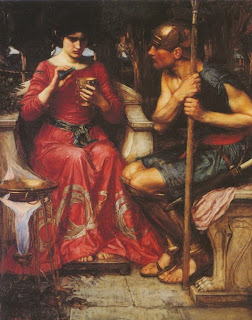When I decided to study Classical Civilization at A-Level, my only knowledge of the Classical world was watching the great films Jason and the Argonauts and Gladiator, and various classical subjects depicted in art. Taking this most curious and wondrous subject has to be one of the best decisions I have made - it is so very interesting! One painting always fascinated me - Medea by Frederick Sandys. I wondered what the story was. After going to see Euripides' play of the same name, I decided to research more about this interesting mythical woman.
Medea by Frederick Sandys 1868. The model was Keomi Gray, a Gypsy woman Sandys used for many of his paintings. They had two sons together, before Sandys married the actress Mary Emma Jones (known as Miss Clive). The painting was submitted to the Royal Academy in 1868 but was rejected because of the paintings subject. It was accepted the following year and received good reviews.
In Greek Mythology, Medea is best known as the wife of the hero Jason, of Jason and the Argonauts fame. She was the daughter of King Aeetes of Colchis, niece of Circe and granddaughter to the sun god Helios. She met Jason and fell in love with him, offering to help him on his quest for the golden fleece, but only if he took her home as his wife. Medea is often depicted as an enchantress or sorceress - she helps Jason using magic; potions, mysterious drugs, predicting the future. She also kills her brother... and Jason kills her understandably outraged father. According to some sources they stop by her aunt Circe to be cleansed for the murders.
Medea by Evelyn De Morgan. I find this depiction rather unusual, because to just glance at the painting you would not suppose this beautiful and serene woman to be a murderous sorceress. I love the flowing lines and colours of the fabric - one of my favourite aspects of De Morgans work.
In his play, Euripides focuses on the later part of Medea's life. Jason has abandoned her for another king's daughter - driven mad by rage she swears her revenge. This takes the form of sending a poisoned dress to Jason's new wife; resulting in the woman's and her father's deaths. Still bent on revenge, Medea also kills her two children by Jason. After their murder, she flees to Athens on a golden chariot pulled by dragons, organised by her sun god grandfather... I suppose the ancient Greek equivalent to a fancy sports car?
Jason and Medea by John William Waterhouse. In this painting, like many, Medea seems very much in control, Jason seems a little bemused and, rightfully, rather worried. In the play, Jason is not portrayed as the manly hero he is famed for, but more a little cowardly man, scared of his ex-wife. This contrast serves to highlight Medea's power over men.
Medea 1862 by Eugene Delacroix
Because this is Ancient Greek myth, there cannot be just one ending - there are many, and none are happy. According to some, Medea murders her children by accident, in other variants she does not kill them at all. Her deliberate murders seem to be an invention of Euripides. As well as having the opportunity to watch some tremendous acting, I was very interested in the content of the play. Because the version I saw was a modern day adaptation, a mad, scary, powerful woman did not seem too far fetched, and her actions seemed like something out of a soap opera. However, to an ancient Greek audience this would have been rather controversial, I think, and I was surprised that her actions went unpunished - she was not put in her rightful place by a man or even punished by the gods by dying horribly. The modernization did loose some context - I am rather disappointed that there was no dragon at the end, though I was consoled with it being a very bloody ending - but it was very good, and interesting to contrast between modern and ancient perceptions. If the chance arises that you are able to see any version of this play please do - it is very interesting and thoroughly enjoyable. I hope my post was of some use to anybody wishing to know a little more about the interesting Medea and I hope my choice of paintings helped.
Best Wishes
Best Wishes




Hey! Loving the blog so far!! It's so interesting :D xx
ReplyDeleteThankyou kindly Leah! You have the honour of being the first to comment on my blog - how fitting, for I was the first to comment on your blog. Nice to know that you find it interesting. I will have a look at your blog and comment also! xx
ReplyDeleteThankyou for your site. Im doing an exphrasis project on Medea in Ovid so these images especially helped.
ReplyDelete